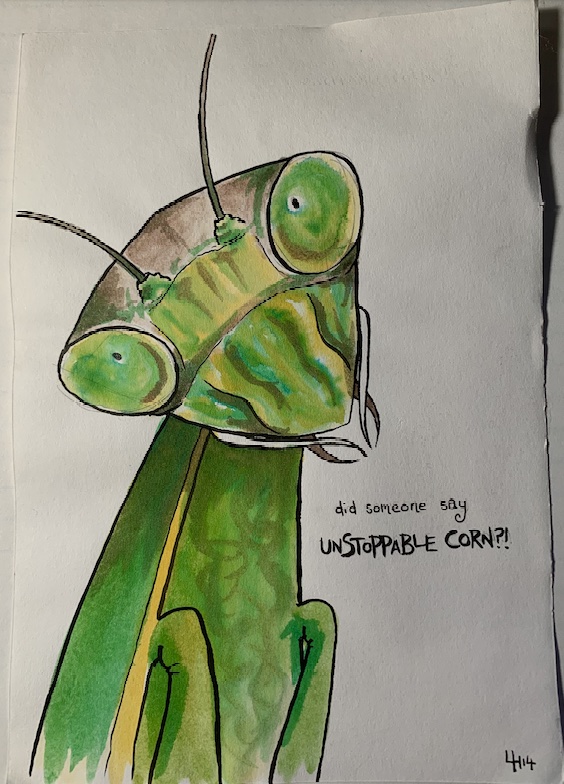–
David Lubar knows a lot about writing books for children. And not just any books — but books that young people will eagerly (and actually!) read. He’s a productive, unpretentious, forthright and seriously funny man who continues to enjoy a remarkably successful career. I thought that I’d invite David to talk about his work and craft. He keeps a terrific, informative website, so we bypassed most of the biographical info that a reader can easily find elsewhere. Look: Here he comes now. Um, yeah. That’s David on the right. He hangs with a well-heeled crowd.
(And no, he didn’t write the Clifford the Big Red Dog books. They’re just friends.)
–
David, you strike me as a writer who thinks about pleasing the reader.
I think about pleasing the stranger who took a seat across the aisle from me on a bus. I’m pathetically eager to please everyone. So, yeah, I want to please my readers.
 I don’t mean to be glib. It’s just that we’ll hear from authors who will say, oh, I write only for myself. Or for posterity or to please the muse. Obviously I’m forced to generalize — you’ve written a wide range of books — but you seem front-and-center with your intention to connect with readers, share some laughs, a fright, entertain.
I don’t mean to be glib. It’s just that we’ll hear from authors who will say, oh, I write only for myself. Or for posterity or to please the muse. Obviously I’m forced to generalize — you’ve written a wide range of books — but you seem front-and-center with your intention to connect with readers, share some laughs, a fright, entertain.
You’re not glib at all. I write to entertain. I have friends who do that, and I have friends who write to feed their soul. Obviously, those things are not mutually exclusive. I love exploring ideas. My muse most often catches fire when I have a high concept to play with. If an idea excites, intrigues, or astonishes me, I figure it will have some sort of effect on my readers. That also means I’m often forging ahead without a road map. It’s all about discovery.
Yes! I wrote a chapter last week that completely surprised me. Totally unexpected. Off the map. It was thrilling and, I think, lifted the story up. These days, I often grumble (to myself: I’m a professional!) when asked to provide a plot synopsis and full outline before the real writing — and the discovery — begins. I’m always like, “They know I haven’t written this yet, right?”
 Same here. Though this can lead to problems for me, since I can end up trying to stuff too many threads into a book. I get sidetracked very easily. I often make charts after the first draft so I can track the plot threads.
Same here. Though this can lead to problems for me, since I can end up trying to stuff too many threads into a book. I get sidetracked very easily. I often make charts after the first draft so I can track the plot threads.
Maybe this connects with your previous life when you worked as a video game programmer. In that context, of course you are trying to please the consumer. Everything is designed to give pleasure — active engagement — of one kind or another.
That’s an interesting observation. And you’re absolutely right –- I always wanted my games to be fun. And I wanted to make the player think. There should be problems and obstacles, but they should always be a fun type of problems to solving. “How can I use this water pistol, a jar of honey, and a gutted trout to slay this cyclops?” (Not a real example from any of my games. Yet.)
How do you stay in touch with your audience? Is it tapping into something internal within you — that poor 12-year-old trapped in David Lubar’s body?
I used to do a lot of school visits. (I had the amazing good fortune to decide to stop traveling a year or so before the pandemic.) Having lunch with a group of readers in the library is a great way to keep in touch with kids. It’s also a great insight into how vital it is for every school to have a library, and a librarian. Since schools have two or three lunch periods, you can meet a lot of kids in one day. Having said all of that, I do think my inner 12-year-old is pretty close to the surface.
Beyond the standard large-group presentations, I often ask for an added session that I call, “Cookies and Conversation.” It’s 25-30 minutes with a small group of students who are willing to give up recess to hang out with an author, kids who need to be there, where 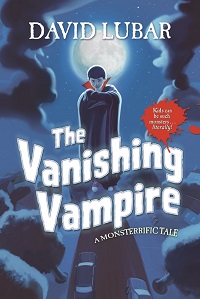 we talk informally about writing and anything else under the sun. It’s always a highlight for me, because I’m not broadcasting, I’m receiving. And, also: cookies!
we talk informally about writing and anything else under the sun. It’s always a highlight for me, because I’m not broadcasting, I’m receiving. And, also: cookies!
That’s a great idea. I know that the lunches where the kids are the ones who want to come are the most fun and interesting.
Yes, but I never get to eat — and all that chewing!
I try to grab a slice of pizza (it’s almost always pizza, except when they make hotdogs because of the Weenies connection) and eat it before the kids arrive. Otherwise, I’d just do that between groups.
Unlike some writers I’ve met, you seem to actually enjoy writing.
I love it. When things flow, time disappears. I love the deep journey of exploring the world in a novel, the speedy gratification of banging out a short story, and the instant thrill of crafting a good one liner. While I tend to speed through first drafts of stories, I should add that I am a compulsive reviser. I’ll go over a story ten or fifteen times throughout the process. And that’s before anyone else sees it. Having said that, I also love playing video games. I’m perfectly capable of enjoying things that might strike others as a waste of time.
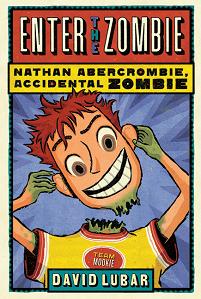 I recently talked with Andrew Smith in another “Talking About Writing” interview, and we both revise as we go, continually. There’s no clear distinction between “first draft” and “revision.” Is that true for you?
I recently talked with Andrew Smith in another “Talking About Writing” interview, and we both revise as we go, continually. There’s no clear distinction between “first draft” and “revision.” Is that true for you?
Absolutely. It’s a major change from when I started. Back in the 1970s, all I had was a typewriter. I’d type my whole first draft. Then make changes on the whole manuscript before retyping it. These days, I always go over the previous day’s work before pushing ahead. Until the ms. gets too long, I might reread the whole thing each morning. The first page or two will inevitably be much more polished than the last.
Same for me. You make a distinction between “serious story writers” and “writers of serious stories.” Do you feel that humor and scary and strange — the types of things you tend to write — and readers tend to love — are generally disrespected? Not by the kids, but, you know, by “them.”
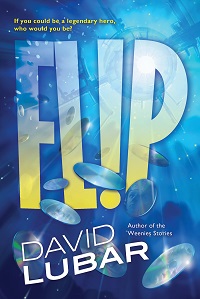 There is definitely a hierarchy of respect. The stories that few people read, and even fewer understand (often because the writer has forgotten to relate an understandable sequence of events) get the most respect from the academic world. (This is changing, thanks to the many wonderful people in colleges and universities who have a passion for a broader range of literature.) Humor is looked down upon in many of the arts, though many of our greatest artists understood joy, play, and delight. A lot of my work could be categorized as funny short-fiction horror for young readers. That’s not exactly fodder for respect and awards. But I can’t complain about that. I’m doing my work with my eyes open.
There is definitely a hierarchy of respect. The stories that few people read, and even fewer understand (often because the writer has forgotten to relate an understandable sequence of events) get the most respect from the academic world. (This is changing, thanks to the many wonderful people in colleges and universities who have a passion for a broader range of literature.) Humor is looked down upon in many of the arts, though many of our greatest artists understood joy, play, and delight. A lot of my work could be categorized as funny short-fiction horror for young readers. That’s not exactly fodder for respect and awards. But I can’t complain about that. I’m doing my work with my eyes open.
It’s good work. You have dedicated readers.
I try not to boast too often, but I can honestly say I feel that I’ve created some excellent stories and novels. The people in the trenches, the librarians, teachers, and parents who give books to kids, have validated this. Early in my career, I really wanted to win the big awards. I desperately wanted institutional accolades and validation. But I get that from my readers. And somewhere between the fart joke on page seven and the slapstick accident on page thirteen, there’s an insight into Zeno’s paradox, time travel, fish biology, or some other dose of mind candy that worked its way into the narrative. The 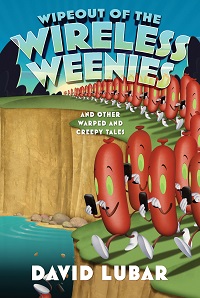 Weenies collections have given me a playing field where I can try all sorts of forms and structures. I doubt I’d want to write a novel that’s nothing but dialogue or a monologue, or one that’s told from the viewpoint of an inanimate object. But I can do that in a story. One of my favorites of my stories, “M.U.B.,” is a dialogue between a girl and the monster under her bead. I discovered it’s a fun read-aloud at schools if I get a kid to read the kid part and I do the monster part. I’d never have written it if I hadn’t been in the mood to experiment with that format.
Weenies collections have given me a playing field where I can try all sorts of forms and structures. I doubt I’d want to write a novel that’s nothing but dialogue or a monologue, or one that’s told from the viewpoint of an inanimate object. But I can do that in a story. One of my favorites of my stories, “M.U.B.,” is a dialogue between a girl and the monster under her bead. I discovered it’s a fun read-aloud at schools if I get a kid to read the kid part and I do the monster part. I’d never have written it if I hadn’t been in the mood to experiment with that format.
I love your sense of playfulness, of trying out ideas just to see what might happen. I sometimes amuse myself by asking the question, “Are you are real writer or just making stuff up?”
I think writing is the only thing I’ve ever done where I never felt like an imposter. Though it pleases and amuses me that I can earn a living by making stuff up.
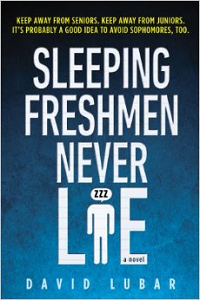 Earlier in your life, you had a persistent dream — to be a writer. You seem like a methodical, passionate, “all in” type of guy. How did you go about learning to become a writer?
Earlier in your life, you had a persistent dream — to be a writer. You seem like a methodical, passionate, “all in” type of guy. How did you go about learning to become a writer?
I wrote. I read. I read lots of great writing, and I read lots of books about writing. It wasn’t a direct path. I wanted to be a cartoonist, and I wanted to be a song writer. I have very little drawing ability. Back in the 1970s, when I was sending out cartoons, that was a liability. I’m sure I gave the cartoon editors at various magazines a lot of laughs, but not in the way I’d intended. As for song writing, I have no sense of pitch, and no real feel for song structure beyond ballads. So I failed pretty spectacularly at both those career paths. But I managed to break in with short humor. I did well with light verse, and sold jokes to comedy services. (There were places that sold packets of jokes to places like radio stations.) I managed to sell some magazine humor, and eventually wrote tutorial articles about programming after I got an Apple II and taught myself to program it. I also wrote five novels that are still taking up a drawer in a file cabinet. Or maybe it’s more accurate to say I typed them.
 Near where I live, the local college frequently hosts guest authors. They come, talk, read something, answer questions from the audience. Great writers, the best in the world. And I always want to ask (but never do): Are you happy with how things turned out? Was it what you had hoped?
Near where I live, the local college frequently hosts guest authors. They come, talk, read something, answer questions from the audience. Great writers, the best in the world. And I always want to ask (but never do): Are you happy with how things turned out? Was it what you had hoped?
That’s a great question. It really gets to the heart of the writing life. And I’ve thought about it from somewhat of a sideways angle. If I could magically go back to the beginning of my writing career, knowing everything I know now, I don’t think things would have turned out any differently. I’ve had plenty of opportunities to break through to a higher level. For example, I was one of the writers who were invited to do a series when Scholastic created their Branches imprint. The imprint, aimed at kids who are just moving from easy readers to chapter books, has been wildly popular. Some of the titles in the series have gone well beyond their initial set of four volumes. If I’d written something with broad appeal, I’d still be writing Branches books today. But I went for the rather metaphysical concept of a kid who finds a coin that gives him the power to make those around him do strange things. It was fun and funny, and it found an audience, but it was definitely not suited for general  readership. So you could say I blew a huge opportunity. But I had fun writing the books, I reached some readers who might have needed that sort of story, and I paid my bills through honest labor. I have no gift for generating mass appeal, and I have no skill at the sort of self promotion that can bring national attention. But that’s okay. I’m happily married, debt free, I have an amazing daughter who will play video games with me, and I have enough retirement savings to live comfortably. Several of my books are still selling well, decades after they were released. So I’d be a fool to feel any other way than satisfied. I did what I loved, it worked out, and a lot of young readers enjoyed my books.
readership. So you could say I blew a huge opportunity. But I had fun writing the books, I reached some readers who might have needed that sort of story, and I paid my bills through honest labor. I have no gift for generating mass appeal, and I have no skill at the sort of self promotion that can bring national attention. But that’s okay. I’m happily married, debt free, I have an amazing daughter who will play video games with me, and I have enough retirement savings to live comfortably. Several of my books are still selling well, decades after they were released. So I’d be a fool to feel any other way than satisfied. I did what I loved, it worked out, and a lot of young readers enjoyed my books.
I’m glad to hear that. Are there aspects to this business that have disappointed you?
Sure. I’ve waded through all sorts of shit storms. Writers, publishers, and editors are people. Some people are wonderful. Some aren’t. Some want to help you. Some want to hurt you. Some are excellent at their job. Others are terrible. Publishing is a business. You’re either an asset or a liability. If your  publisher needs to throw you under a bus for the sake of the bottom line, the passengers on the bus are going to feel a bit of a bump in the road. Editing is a profession. Editors answer to publishers. Your editors will never love you as much as they love their paycheck.
publisher needs to throw you under a bus for the sake of the bottom line, the passengers on the bus are going to feel a bit of a bump in the road. Editing is a profession. Editors answer to publishers. Your editors will never love you as much as they love their paycheck.
Whoa, I’m italicizing that one. My great pal, Craig Walker, an editor at Scholastic, once told me that I needed to think not about what Scholastic could do for me, but about what I could do for them. That is, make them money.
I think, because writing is so personal, and rejections of various flavors, both of manuscripts by publishers and of published works by readers and reviewers, is so woven into the writing life, writers are especially vulnerable to feeling all sorts of bitterness, resentment, and envy. But this also allows for heroic moments and acts of grace. There are writers I’d take a bullet for. There are even writers I’d share my best bourbon with.
 Kids often ask about rejection and I try to frame my response around the larger context of life itself. The world rejects us constantly. We get cut from teams, not invited to birthday parties, love someone who doesn’t love us back. We’re too fat, too slow, not attractive enough. Somehow we all have to push through that and believe in ourselves, believe in our value.
Kids often ask about rejection and I try to frame my response around the larger context of life itself. The world rejects us constantly. We get cut from teams, not invited to birthday parties, love someone who doesn’t love us back. We’re too fat, too slow, not attractive enough. Somehow we all have to push through that and believe in ourselves, believe in our value.
Wow. I’ve never thought of it that way, but that’s such an excellent answer. I will definitely share it with anyone it might help.
Let’s be honest. We’re both old white guys, over 60. Not past our prime as writers, but also not the hottest demographic in the marketplace. I’ve talked to quite a few well-known authors — big, recognizable names — men and women — who have talked about leaving children’s books. There’s just a general sense of disappointment. Of no longer being valued. Do you think that’s just the nature of things? Out with the old, in with the new?
Sure. I definitely got a sense that I was drifting into obscurity and irrelevance during the last few conferences I attended. That’s probably the case in most fields. Each new generation kills and eats their predecessors. Other than one contractual obligation, I’m taking a break from writing at the moment. But if there’s a book I feel I want or need to write, I’ll write it and hope someone loves it enough to publish it. There’s a lot of joy in knowing I can write whatever I want. It could be an adult novel, a light-verse collection for kids, a collection of essays, or even a screenplay. Or none of the above.
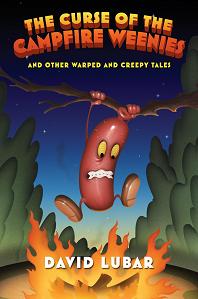 You’ve said that revision is your favorite part of writing.
You’ve said that revision is your favorite part of writing.
Absolutely. First of all, it’s essential because, as I mentioned earlier, I bang out my first drafts pretty fast. So there’s a lot to clean up and reorganize. My brain doesn’t hand me things in a perfect chronological sequence. I need to put all those afterthoughts where they belong. Or put them out of their misery. And I need to go back and describe important items, places, and people, because I tend to gloss over that in the first draft. Just as important, revision is a pleasure because it’s really an exercise in problem solving. I feel a physical jolt of joy when I solve a tough problem in a story, or when a new plot opportunity hits me. It’s craft. It’s invention and discovery.
To me, that’s the thing that keeps me going in this business. Getting off the floor, dusting myself off. The work. The pleasure of creativity. Making things. All that other noise can get disheartening at times. But writing a story, those moments when we’re leaning in, that’s the part I’ll never give up.
 Nicely put. We make new things. It brings us joy. If we’re lucky, it brings joy to other people.
Nicely put. We make new things. It brings us joy. If we’re lucky, it brings joy to other people.
It’s a disconcerting form of self-sabotage, but more and more I’ve been writing things that don’t fit the marketplace. Picture books that are too long. Chapter books that are too literary. Stuff that won’t even get past my agent, because no editor will buy it. And yet I write it anyway. I’m an idiot, clearly.
Oh yeah. That sounds familiar. I like to say I’ve always worked hard but rarely worked smart. But I got lucky. I am incredibly fortunate to have managed to do well with short stories. Everyone will tell you that stories don’t sell. It’s true, for the most part. Novels sell much better than story collections. And most publishers wouldn’t even consider a collection from an unknown writer. I didn’t care. That’s what I wanted to write. I kept at it. And it worked out.
Yes, I admire that so much. I’m inspired by that. I aspire to that mode of writing. Being true to yourself outside of any conventional ideas of what you “should” be writing (and still managing to survive financially). Somehow you created a format that no one was clamoring for, no one wanted. But you made it work and created your own joyful universe.
 I am incredibly fortunate that it worked out well. And I will happily give a lot of the credit to Bill Mayer. His cover art is what gets kids to pick up those books. It’s my job to keep them reading, but I might never have that chance if the covers weren’t so intriguing.
I am incredibly fortunate that it worked out well. And I will happily give a lot of the credit to Bill Mayer. His cover art is what gets kids to pick up those books. It’s my job to keep them reading, but I might never have that chance if the covers weren’t so intriguing.
Last question. I read somewhere that you believed that Character, Driven was your best book. Tell us why you feel that way.
It’s a visceral thing. The feeling comes from my gut, not my brain. I think, in part, this comes from writing something for the oldest segment of YA readership. I could get as deep, honest, and brutal as I wanted. Not that I’ve held off on anything essential to the story in my younger books, but I think all writers practice some degree of internal censorship. And I think that’s a good thing. We all should have a sense of our audience. The book is also one of my few real-life novels. Dunk, which I considered my best book until I wrote Character, Driven, is also real life. Maybe that’s a clue about what I should write next. Not that I expect to finally start making smart business decisions at this point in my life.
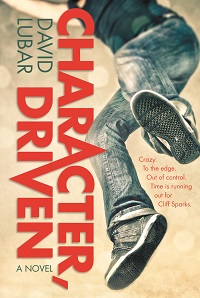 You are beyond that now, aren’t you? You’re free. That’s the wonderful thing. I’m eager to see what comes next.
You are beyond that now, aren’t you? You’re free. That’s the wonderful thing. I’m eager to see what comes next.
Good point. I’m beyond the need to make smart business decision as far as earning a living, but I guess I was thinking in terms of reaching a broader audience. As nice as it is to follow my muse — and if my muse tells me to write 1,000 haiku about banana peppers, so be it — it would also be nice to reach a larger audience, or even to have a bestseller. Admittedly, that’s mostly for the sake of my own ego. As for your eagerness, I appreciate it. That’s most kind of you.
Well, David, I want to thank you so much for spending this time with me. It’s been fascinating to meet you in this way. I especially appreciate your openness and honesty. I hope we get to hang out in real life someday. And I’m curious about that bourbon you mentioned.
Currently, the best bourbon on hand is Woodford Double Oaked. That was a splurge. But there’s always Templeton Rye and Basil Hayden’s Dark Rye in the cabinet, for sipping, and Old Overholt for making an old fashioned. I hope I get a chance to enjoy a glass or two with you.
DAVID LUBAR is the author of more books than, frankly, I care to list. He created the Nathan Abercrombie, Accidental Zombie series, as well as the uproarious Weenies Stories short story collections. For older readers, there’s Hidden Talents; Flip; Character Driven; and many more. He’s renowned for his sense of humor, empathy, and zippy storytelling that reaches even the most hard-to-reach kids. He lives in Nazareth, Pennsylvania. Google him to find out more (I’m tired).
As for me, James Preller: You might know my Jigsaw Jones mystery series. My most recent book is titled Upstander, a stand-alone novel that also serves as sequel/prequel to Bystander. It follows Mary’s experiences, enters her home life, and includes a strong Substance Use Disorder (SUD) storyline. I’m proud that both books were named Junior Library Guild Selections — ten years apart.
–
–








